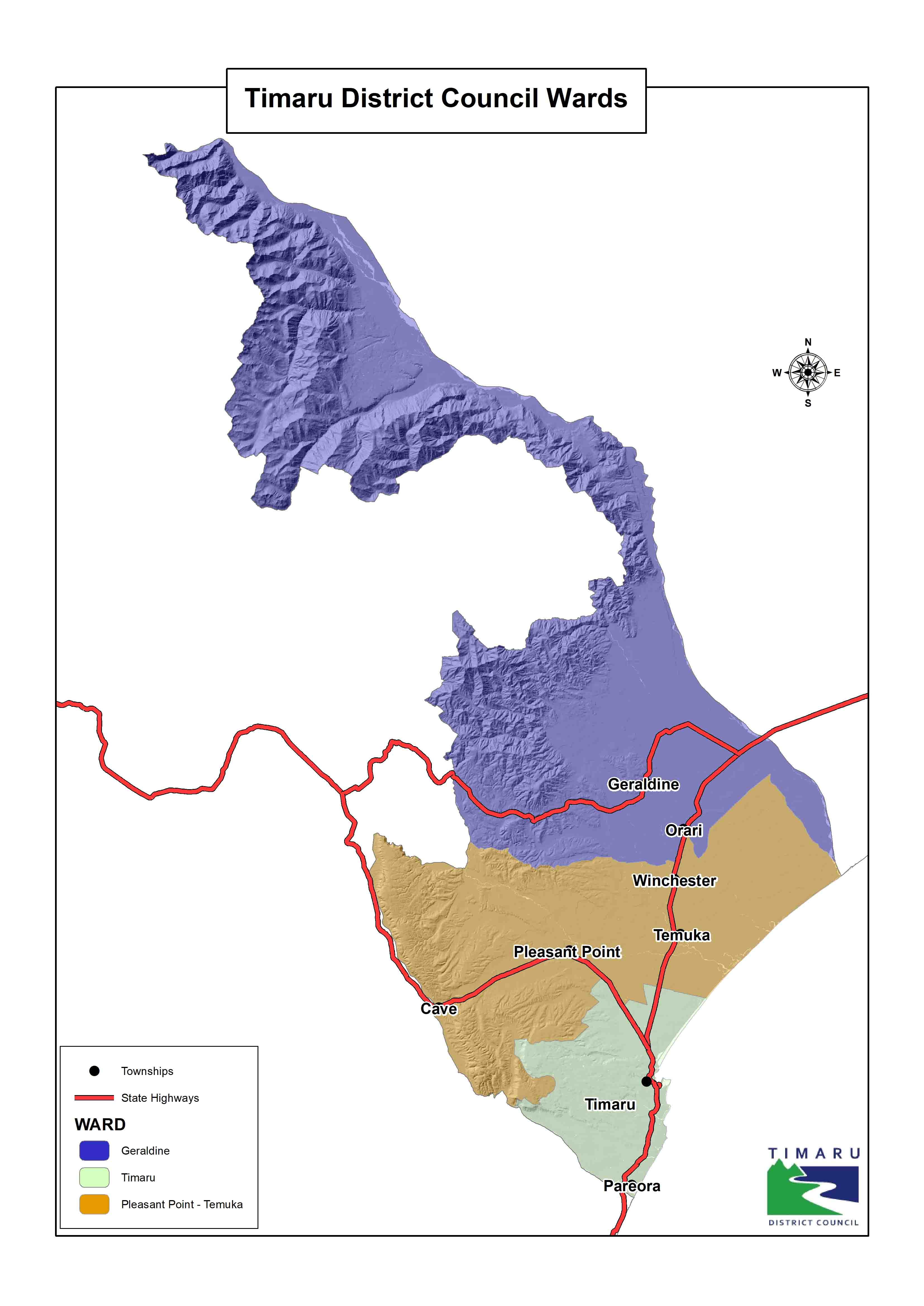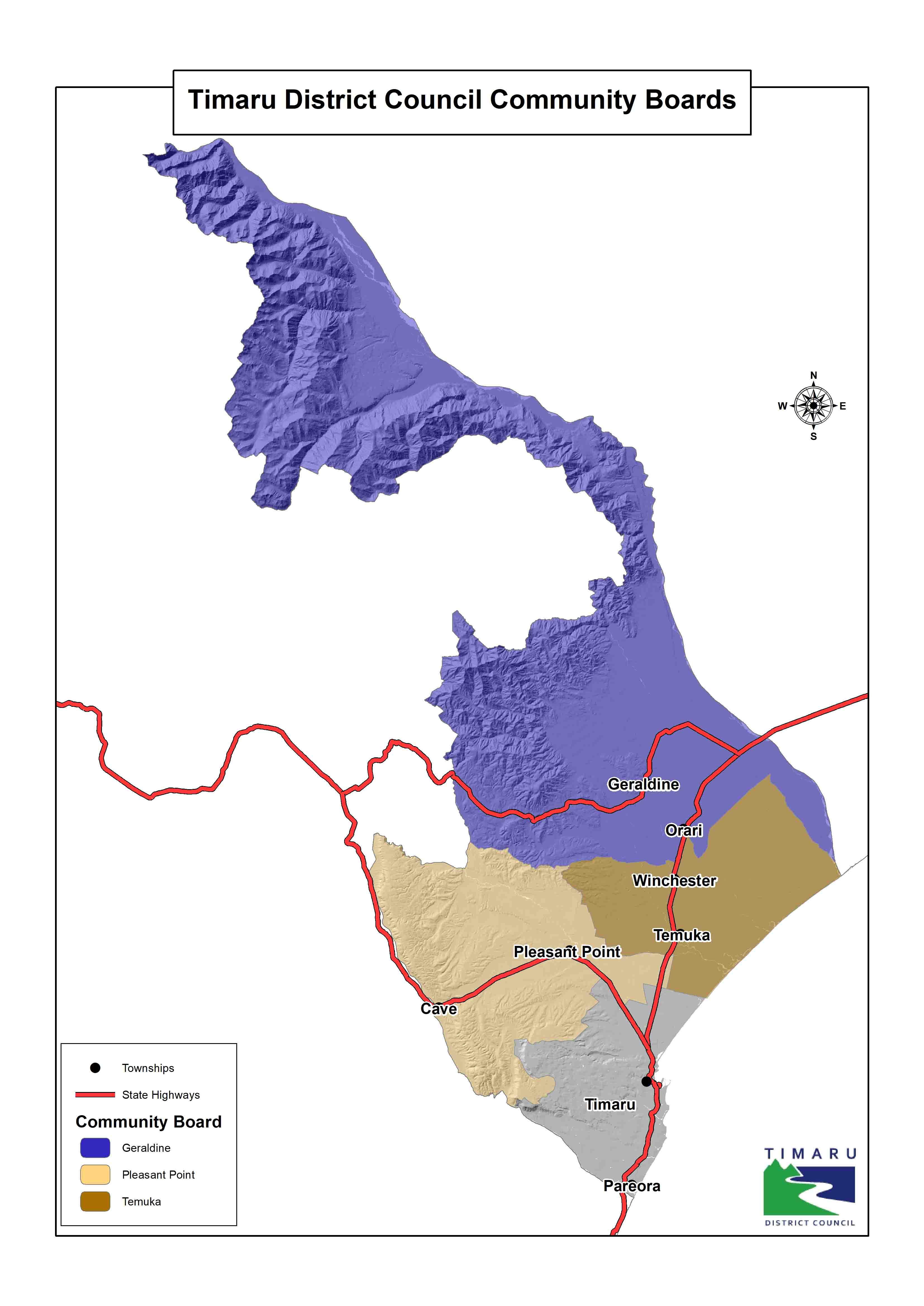Representation Review 2018
Final Proposal
Council considered one submission received on the Representation Review at a hearing on the 16th October, 2018. As a result of that meeting no changes were made to the Initial (Draft) Proposal. You can read the report for that agenda and minutes below:
Extraordinary Council 16 October 2018 Agenda
Extraordinary Council 16 October 2018 Minutes
The Final Proposal for the Representation Review was advertised on the 20th October 2018, with any appeals closing on the 20th November 2018.
Any person who made a submission on the Council’s initial proposal may lodge an appeal against the Council’s decision. An appeal must relate to the matters raised in that person’s submission.
Initial (Draft) Proposal
Timaru District Council is reviewing its representation arrangements prior to the local body elections in 2019 and would like to know what you think about the proposal. It has now decided on an initial (draft) proposal for consultation with the community. If you would like to submit on the proposal please send your comments to the Council by 5pm, Monday 17 September 2018.
In summary, the initial (draft) proposal is:
- Mayor elected at large
- 9 Councillors elected through 3 wards (Geraldine ward – 1 Councillor, Pleasant Point – Temuka ward – 2 Councillors, Timaru ward – 6 Councillors)
- 3 community boards elected with the following membership:
| Board | Elected Members | Appointed Members |
|---|---|---|
| Geraldine | 6 members elected by the Geraldine community as a whole | The Councillor elected for the Geraldine Ward |
| Pleasant Point | 5 members elected by the Pleasant Point community as a whole | The two Councillors elected for the Pleasant Point – Temuka Ward |
| Temuka | 5 members elected by the Temuka community as a whole | The two Councillors elected for the Pleasant Point – Temuka Ward |
The maps below show the boundaries of these areas. There are no changes to the existing boundaries.


Use the tool below to find out which ward or community board you are in:
The Initial Proposal public notice, including reasons for the proposed changes can be viewed below:
The summary document below includes the Initial Proposal details and a summary of the process to date, including maps. This is also available at council offices and service centres.
How to have your say
Submissions have now closed.
Please note your submission will be available to the public and media as it will be part of the Council’s decision-making process. If you need any assistance, please contact Council at (03) 687 7200.
Submissions close 5pm, Monday, 17 September, 2018
Late submissions will not be considered
Background
Representation Reviews are carried out once every six years under the Local Electoral Act. They require the Council to consider its electoral arrangements, including:
- The number of Council elected members;
- Whether the members are to be elected by wards, at large or a combination of both;
- The boundaries and names of those wards and the number of members that will represent each ward;
- Whether community boards should be established or retained and if so, the number of members (elected and appointed).
Where a ward system is selected, the +/- 10% rule applies. This means that for each ward a Councillor must represent the same number of people, plus or minus 10%. The current review is based on the following population numbers:
| Ward | Population* | Members | Population per member |
|---|---|---|---|
| Geraldine | 5,730 | 1 | 5,730 |
| Pleasant Point/Temuka | 9,560 | 2 | 4,780 |
| Timaru | 31,800 | 6 | 5.300 |
| Total | 47,090 | 9 | 5,232 |
* Statistics NZ population estimates as at 30 June 2017
Frequently Asked Questions
How have we carried out the Representation Review Process this time?
For this review round, Community Boards have considered a Discussion Document and Council have workshopped options prior to confirming this decision. Background papers and reports can be found below.
Geraldine Community Board Agenda/Minutes - 30 May 2018
Pleasant Point Community Board Agenda/Minutes - 29 May 2018
Temuka Community Board Agenda/Minutes - 28 May 2018
Council Agenda/Minutes - 7 August 2018
How has this changed representation arrangements?
There are no changes proposed to current representation arrangements.
Why has the Council decided there should be no changes?
The Council have decided on no changes to the current representation arrangements for the following reasons:
- All wards comply with the legislative requirements and provide for fair representation;
- The growth patterns predicted in the District Growth Strategy indicate that compliance will continue in future years;
- The existing ward and community board structure is well understood by the electors;
- The Council is satisfied that the existing structure will continue to provide effective representation for the District’s distinct communities of interest; and
- No significant changes have occurred since 2012 to indicate that the Council should be proposing changes to its representation arrangements at this time.
What happens once submissions close?
Once submissions close, if a hearing is required, the Council will hear those who wish to speak to their submissions. The Council will consider the submissions and make any other investigations or enquiries it considers necessary. The Council will then decide whether to issue a final proposal based on the initial proposal; or issue a final proposal amended from the initial proposal. The Council’s final proposal will be publicly notified.
What’s the rest of the process involve?
The rest of the Representation Review 2018 process is summarised below:
| Thurs 16 August – Mon 17 September 2018 | Consultation period |
|---|---|
| Tues 16 October 2018 | Rep Review hearing and adoption of final proposal |
| Sat 20 October 2018 | Public Notice of Final Proposal |
| Sat 20 October to Tues 20 November 2018 | Appeals/Objections Period |
| 15 January 2019 (if required) | Latest date by which appeals/Objections can be forwarded to the Local Government Commission |
| 11 April 2019 | Latest date by which the Local Government Commission can determine Appeals/Objections |
If I don’t agree with the final decision of Council in October can I appeal or object to the decision?
Yes. However, you can only object to the final proposal if it is different from the initial proposal. If the final proposal is unchanged, only those who submitted on the initial proposal can appeal the final proposal. Any objections or appeals are then forwarded to the Local Government Commission who determine the final makeup of the Council.
If it goes to the Local Government Commission, how do they treat it?
The Local Government Commission only get involved if there are appeals or objections on the Council’s final proposal. Should appeals or objections be received, the Local Government Commission will consider the Council’s final proposal together with any appeals and objections. The Local Government Commission may hold hearings with those who made appeals and objections which may take place in the Timaru District. The Local Government Commission makes a final determination which is only subject to judicial review in respect of matters of law. This process must be concluded by 11 April 2019.
What about having a Māori ward?
Under existing legislation the comparatively low Māori population in the district means this option is not currently valid in Timaru District.
Doesn’t having more elected members mean ratepayers would have to pay more because councillors would be paid more?
Central government’s Remuneration Authority sets the level of remuneration for each individual position. We don’t know if the number of Councillors affects this decision.
Isn’t an even number of Councillors a problem in making decisions?
Many Council decisions are made by consensus. In the event where there is a ‘split vote’ (e.g. 5-5), the Mayor has the option to use a casting vote as part of the democratic process. An even number of Councillors might increase the likelihood of this occurring more regularly.
With a mixed system, could a candidate stand for both an ‘at large’ and ward position?
No. Electoral legislation only allows a Council candidate to stand either at large or in a ward.
Don’t all Councillors represent the District?
Absolutely. Even if a Councillor is elected in a ward, they are obligated by law to take a district-wide perspective on all issues being discussed and decided by the Council.
How is the Mayor elected?
The Mayor is required by legislation to be elected at large.
When are the next local government elections?
The next local government elections will be held on Saturday 12 October 2019.
What about changing the voting system?
The Council have agreed to retain the First Past The Post (FPP) for the 2019 elections. The review does not deal with this issue.
Other Links
The Local Government Commission have produced guidelines for representation reviews which are included below.
- Local Government Commission guidelines
- Representation Review Process Diagram
- Local Government Commission
Last updated: 12 Apr 2021